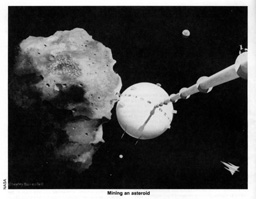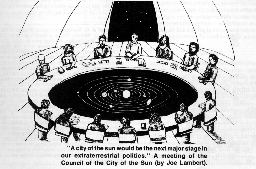The search for extraterrestrial intelligence may be the first step toward involving the human species in cosmic politics. SETI would perform an ancient and respectable political function: the gathering of intelligence about other political entities. It would be essential in establishing the receiving end of the political communications process. And it may enable intelligent beings to give politics a higher purpose.
The Relevant Universe
Each society has its own conception of the relevant universe. Such a shared conception may be evolving among informed humans around the globe. Our recently acquired ability to see the Earth from an extraterrestrial perspective has encouraged us to see our world as a closed, bounded system, and our ecology as a thin layer of minerals, liquid, and gas between the lifeless bulk of the Earth and the cold and dark of space. We have perceived the finiteness of our familiar environment, the ultimate limits to human growth on Earth. Our conception of ourselves as a species has sharpened; we now recognize our common origins and — as long as we all remain on this planet — our common destiny. We are coming to the conclusion that many problems must be solved at the species level, through cooperative action. Joint action on larger scales, for larger purposes, may be crucial for the long-term success of a species whose political subdivisions are armed with increasingly
powerful technologies.
These perceptions may be driving the slow emergence of an ethos of the Earth. That ethos, in turn, may be one of the foundations of the conception of the species as a political entity — a global polis, as the ancient Greeks called the political society of the city-state. But this conception of the Earth and its human cargo sets us off from the cosmos, like a sealed spaceship flying through nothingness; it makes the external environment of the Earth seem irrelevant. This conception of the Earth as a closed world means that, for all practical purposes, our relevant universe is as closed
and geocentric as the astronomical universe was before Copernicus.
Beyond the Limits of the Earth
At the same time, our species has improved its perceptions of its larger environment through astronomy and planetary exploration. Those activities, given new range and acuteness by space transportation, orbiting platforms, and improved sensing technologies, provoke larger dreams by revealing other worlds in unprecedented detail, suggesting that we someday might utilize them as habitats or resources, becoming a multi-planet species. We are in the early stages of a search for extrasolar planets, with its long-term implications of interstellar colonization.
But astronomy also is revealing the true scale of the universe, and is further confirming the non-centrality of the Earth, our solar system, and the Milky Way galaxy. Astronomy invites us outward; at the same time, it makes the universe seem vast, lonely, and empty, encouraging us to turn inward. We feel small, and helpless.
Humankind has made the first tentative extension of its presence beyond the Earth. After initial exploration of nearby space, we began expanding economic and military activity outward; now the major space powers each have interests in space to protect. We have entered the first stage of extraterrestrial politics, an outward extension of the politics we have known on Earth. But we, at least in the West, are still unsure about what long-term human purposes in space should be; we have not decided whether we should enlarge our conception of the relevant universe, and expand humanity beyond the earth.
The Extraterrestrial Paradigm
The terrestrial paradigm — a powerful conceptual pattern — convinces many that Humankind will remain confined to the Earth, and must adjust to that limitation. But there also is an extraterrestrial paradigm which suggests that Humankind should expand outward, utilizing larger resources and living space, ultimately escaping the limits to growth on Earth. To a significant extent, our long-term future will be determined by the relative power of these paradigms, and their political expression. Given the scale of effort and organization needed for large extraterrestrial
ventures, they will have to be the results of societal decisions, and therefore will be political questions.
"Astronomy invites us outward; at the same time, it makes the universe seem vast, lonely, and empty, encouraging us to turn inward."
 If humans choose to expand beyond the Earth, they will begin with the colonization of space and other worlds within our own solar system. Many designs already exist; some, such as the space colonization proposals of Gerard O'Neill,* (*See interview with Gerard K. O'Neill in the March 1979 COSMIC SEARCH, page 16.) include economic justifications for expansion. These steps might be followed by such macro-engineering projects as the mining of the Moon and the asteroids, the terraforming of Mars and Venus, the transport of outer solar system ices and gases into the inner solar system, and even the rearrangement of the solar system into a form more useful to the human species, perhaps leading to a Dyson sphere around the Sun.
If humans choose to expand beyond the Earth, they will begin with the colonization of space and other worlds within our own solar system. Many designs already exist; some, such as the space colonization proposals of Gerard O'Neill,* (*See interview with Gerard K. O'Neill in the March 1979 COSMIC SEARCH, page 16.) include economic justifications for expansion. These steps might be followed by such macro-engineering projects as the mining of the Moon and the asteroids, the terraforming of Mars and Venus, the transport of outer solar system ices and gases into the inner solar system, and even the rearrangement of the solar system into a form more useful to the human species, perhaps leading to a Dyson sphere around the Sun.
 Larger projects would require not only more powerful technologies, but larger scales of economic and political organization, perhaps encouraging the emergence of a solar system civilization. There might be many autonomous biospheres, and independence movements that would challenge central authority. But in time there might evolve a solar polis, a city of the Sun. This would be the next major stage in our extraterrestrial politics.
Larger projects would require not only more powerful technologies, but larger scales of economic and political organization, perhaps encouraging the emergence of a solar system civilization. There might be many autonomous biospheres, and independence movements that would challenge central authority. But in time there might evolve a solar polis, a city of the Sun. This would be the next major stage in our extraterrestrial politics.
There may be a discontinuity in human expansion, and in extraterrestrial politics, at the outer edge of the solar system. Interstellar flight by humans may remain, for a long time, so difficult and expensive that only the expanded Gross Human Product of a solar system civilization could support it. Would we go? Given the problems of human interstellar flight, exploration could be accomplished more efficiently by unmanned interstellar probes. Manned starflight may be undertaken only as a one-way trip, in response to political events within our solar system, to a crisis that threatens human survival, or to a transcendental vision of the human future. In each case, the purpose would be to found human colonies.
Interstellar colonization could begin a new dispersal and diversification of the human species — and a new level of politics. Governing far-flung star colonies from a central point would be difficult if not impossible, unless we find some way to get around or through the structure of space-time as we now understand it. Interstellar colonies would have to be self-sufficient and autonomous. This could lead to independent political entities which might eventually evolve into separate descendant species. However, the centralizing tendencies of politics are strong, and might be aided by scientific breakthroughs and technological change. Instead of fragmenting politically, the expanded human polis might establish new scales of organization, capable of carrying out ever larger tasks: macro-engineering, humanizing, manipulating matter and energy on interstellar scales as ancient oriental empires manipulated water in massive irrigation works. Humans someday may realize the science fiction vision of a galactic society, whether fragmented or centralized in a galactic empire. This would be the next stage of extraterrestrial politics.
At each stage of growth, humans would be expanding their noosphere — their realm of consciousness. But that may be followed by the expansion of the ethosphere, the realm of human values, perhaps leading to the formation of a larger cultural entity and a larger polis.
"Interstellar colonization could begin a new dispersal and diversification of the human species — and a new level of politics."
But humans may never conquer the universe. It is expanding rapidly, its parts flying away from one another. Its scale already has become so vast that humans may never catch up with all of it or mobilize enough energy to organize it and shape it to their design. William Gale and Greg Edwards have calculated that the mass horizon at which half the matter can be prevented from expanding farther is about 1.6 giga-light years — a colossal distance, but not all the universe. Those dimensions may suggest the ultimate limits to the humanization of the cosmos.
Our remote descendants, for all their powers and their expanded scales of political, economic, and technological organization, may still face, as we do, the implications of a universe rushing outward toward a slow, cooling death, or eventually collapsing inward toward a more rapid one.
Either destiny could induce philosophical and political fatalism, a sense of meaninglessness about human existence. Have we evolved to consciousness only to face an irreversible slide toward ultimate collective death, hot or cold?
Other Lives, Other Paradigms
This is where the search for extraterrestrial intelligence has unique significance. If the search is successful, we might enter a long-term dialogue among the stars. We might listen, like children in the Australian Outback tuning in on the School of the Air. Or we might be admitted to a community of intelligences, like Bracewell's Galactic Club. But the assumption that contact among intelligent species could occur only by indirect means, such as radio or some other manipulation of the electromagnetic spectrum, may reflect a bias. Having thought about our own possible future expansion into the universe, we must consider the possibility that other civilizations also might choose to expand.
Other intelligent species which evolved on planetary surfaces may have reached the stage of a planetary civilization, perhaps long before we did. Many, perhaps most, may have accepted a limited, planetary paradigm of their relevant universes and their futures, even if some had developed the technological means to migrate beyond their original biospheres, and the perceptions of external reality to motivate such expansions.
Some of these planet-bound civilizations might conceive of other intelligences in the universe, and might try to detect them or communicate with them. But if such civilizations accepted their planetary ecologies as their relevant universes, how long would they maintain the effort to detect or communicate with others? The search for alien intelligences may be a transient phenomenon; social values and political leaderships change on time scales that are short compared to cosmic and biological evolution.
Some intelligent species with adequate technological powers—possibly a small minority—may adopt extraplanetary paradigms and expand their presence and influence in the universe. They too might form expanding noospheres and ethospheres. But each ethosphere would be species-centered, and each would be different.
Eventually, such expanding civilizations may come into contact. That contact may occur first by radio or some other indirect means. But if interstellar flight is possible, expansion could lead to direct contact, and detection by indirect means could encourage movement toward that event.
What happens when different ethospheres touch? That moment may be the most important turning point in the history of intelligence, after the creation of language and technology. Among civilizations of relatively equal power, it could lead to suspicion, fear, even conflict, to the conception of survival as a zero-sum game. But contact is much more likely to be a demonstration of the politics of inequality. The outcome may depend on the ethos of the more powerful species, on its conception of the value of intelligence in the universe.
"What happens when different ethospheres touch? That moment may be the most important turning point in the history of intelligence."
We can hope that contact among intelligent species will lead to a higher ethos, a larger polis, and the formation of a new scale of organization for social tasks. This may be possible only if the species coming into contact find political solutions to their concerns, or if a superior species has a value system that encompasses the worth of other intelligences. To extend the concept of altruism to another species to strengthen the prospects for the survival of intelligence would be an act of statesmanship of the highest order. Contact, then, would allow — and perhaps require — a new and vastly larger conception of politics and its purposes. It would be, for us, a higher level of extraterrestrial politics.
Survival
The ultimate goal of a community of intelligence, the transcendental vision that gives purpose to the cosmic polis and guides its work, may be to assure the survival of intelligence in a universe that is indifferent to it. This may be the ultimate ethical act — and getting from an atomized diversity of intelligences to a conscious, directed universe may be the supreme political challenge.
If Gale and Edwards are right, no one species can control the universe or shape its future. Only if the intelligent species of the universe work together can they hope to reverse the running down of the cosmos that we measure as entropy, or its collapse into a new primeval fireball. Failing that, it may take their collective knowledge and abilities to find another escape from cosmic death. Cosmic politics, then, may be essential to the long-term survival of intelligence in the universe.
As SETI gets under way, we will be making choices about our own role in the universe through our political decisions about the future of spaceflight, and our attitudes toward the extraterrestrial paradigm. One may argue that our species cannot contribute to the community of intelligence unless we search for evidence of its existence and communicate with it. One also may argue that our contribution will be significant only if we adopt an extraplanetary model of our future, so that we may expand our influence on the universe and join with others in the tasks of assuring long-term survival. If we find no others, these tasks will be ours alone.
 Michael A. G. Michaud is Deputy Director of the Office of International Security Policy, a branch of the U.S. State Department in Washington. He was born in 1938, and received Bachelor's and Master's degrees from the University of California at Los Angeles in political science. He has been with the State Department ever since. His distinguished foreign service career spans a wide range of diplomatic and administrative assignments in Europe, Asia and Australia as well as in the United States. He is author of over 30 publications dealing with the societal consequences of SETI and spaceflight, as exemplified by: "The Consequences of Contact" (American Institute of Aeronautics and Astronautics Student Journal, Winter 1977-78), "Spaceflight and Immortality" (Life Extension Magazine, July/August 1977), and "Interstellar Negotiation", (Foreign Service Journal, December 1972). This same theme is also carried through to his memberships in organizations like the L-5 Society, The British Interplanetary Society, The World Future Society and the Sierra Club. He is also a member of the International Institute for Strategic Studies, The
National Space Institute, The Royal Central Asian Society and the American Foreign Service Association. His unique combination of wide diplomatic experience, interest in outer space and communicative abilities make him a frequent invited participant on panel discussions related to the social aspects of space exploration.
Michael A. G. Michaud is Deputy Director of the Office of International Security Policy, a branch of the U.S. State Department in Washington. He was born in 1938, and received Bachelor's and Master's degrees from the University of California at Los Angeles in political science. He has been with the State Department ever since. His distinguished foreign service career spans a wide range of diplomatic and administrative assignments in Europe, Asia and Australia as well as in the United States. He is author of over 30 publications dealing with the societal consequences of SETI and spaceflight, as exemplified by: "The Consequences of Contact" (American Institute of Aeronautics and Astronautics Student Journal, Winter 1977-78), "Spaceflight and Immortality" (Life Extension Magazine, July/August 1977), and "Interstellar Negotiation", (Foreign Service Journal, December 1972). This same theme is also carried through to his memberships in organizations like the L-5 Society, The British Interplanetary Society, The World Future Society and the Sierra Club. He is also a member of the International Institute for Strategic Studies, The
National Space Institute, The Royal Central Asian Society and the American Foreign Service Association. His unique combination of wide diplomatic experience, interest in outer space and communicative abilities make him a frequent invited participant on panel discussions related to the social aspects of space exploration.
![[NAAPO Logo]](../../Images/NAAPOsm.jpg)
![[NAAPO Logo]](../../Images/NAAPOsm.jpg)